|
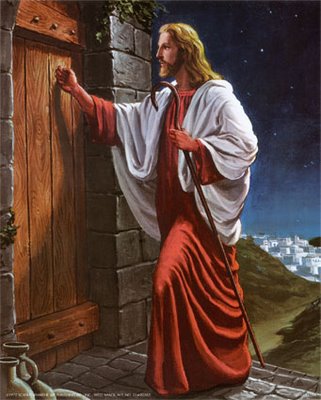
In Revelation 3:20 Jesus said, Behold, I stand at the door,
and knock: if any man hear my voice, and open the door, I will come in to him, and will sup with him, and he with me. The word "sup," in this context means full acceptance and fellowship on the part of Jesus Christ. I learned this verse forty years ago as a soul-winning verse. I think it is that, although Jesus gives it within
the context of his message to the "luke-warm" Church at Laodicia, Revelation 3. Revelation 3: 14 And unto the angel of the church of
the Laodiceans write; These things saith the Amen, the faithful and true witness, the beginning of the creation of God; 15 I know thy works, that thou art neither cold
nor hot: I would thou wert cold or hot. 16 So
then because thou art lukewarm, and neither cold nor hot, I will spue thee out of my mouth.
17 Because thou sayest, I am rich, and increased with
goods, and have need of nothing; and knowest not that thou art wretched, and miserable, and poor, and blind, and naked: 18 I counsel thee to buy of me gold tried in
the fire, that thou mayest be rich; and white raiment, that thou mayest be clothed, and that the shame of thy nakedness
do not appear; and anoint thine eyes with eyesalve, that thou mayest see. 19 As many as I love, I rebuke and chasten: be zealous therefore, and repent. 20 Behold, I stand at the door, and
knock: if any man hear my voice, and open the door, I will come in to him, and will sup with him, and he with me. 21 To him that overcometh will I grant to sit
with me in my throne, even as I also overcame, and am set down with my Father in his throne.
22 He that hath an ear, let him hear what the Spirit saith
unto the churches. The JFB commentary below does a good job of explaining Jesus' letter to
the Laodicians. I am happy with the 1871 publication date, as this means the commentator's brains
were largely PRE-DARWIN, that is, not contaminated by the wrongful thinking that enters subliminally into modern academic's
reasonings. The JFB is in the public domain.
Commentary Critical
and Explanatory on the Whole Bible Robert
Jamieson, A.R. Fausset, and David Brown 1871 (JFB)
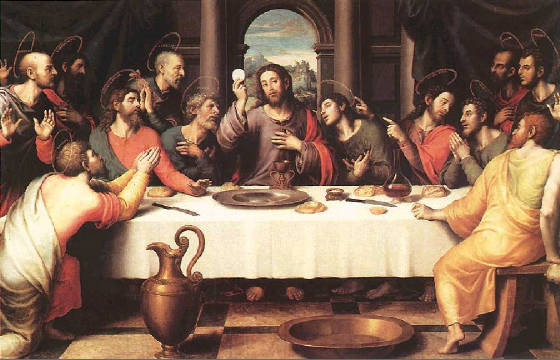

|
|
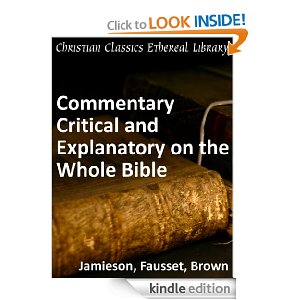
JFB commentary, Revelation 3: 20. stand—waiting
in wonderful condescension and long-suffering. knock—(So 5:2). This is a further manifestation of His loving desire for the sinner's salvation. He who is Himself "the Door,"
and who bids us "knock" that it may be "opened unto" us, is first Himself to knock at
the door of our hearts. If He did not knock first, we should never come to knock at His door. Compare So 5:4-6, which is plainly alluded to here; the Spirit thus in Revelation sealing the canonicity of that mystical book.
The spiritual state of the bride there, between waking and sleeping, slow to open the door
to her divine lover, answers to that of the lukewarm Laodicea here. "Love in regard to men
emptied (humbled) God; for He does not remain in His place and call to Himself the servant whom He loved, but He
comes down Himself to seek him, and He who is all-rich arrives at the lodging of the pauper, and with His
own voice intimates His yearning love, and seeks a similar return, and withdraws not when disowned, and is not impatient
at insult, and when persecuted still waits at the doors" [Nicolaus Cabasilas in Trench]. my
voice—He appeals to the sinner not only with His hand (His providences) knocking, but with
His voice (His word read or heard; or rather, His Spirit inwardly applying to man's spirit the
lessons to be drawn from His providence and His word). If we refuse to answer to His knocking at our door now,
He will refuse to hear our knocking at His door hereafter. In respect to His second coming also, He is even
now at the door, and we know not how soon He may knock: therefore we should always be
ready to open to Him immediately. if any man hear—for man is not compelled by irresistible force: Christ knocks,
but does not break open the door, though the violent take heaven by the force of prayer (Mt 11:12): whosoever does hear, does so not of himself, but by the drawings of God's grace (Joh 6:44): repentance is Christ's gift (Ac 5:31). He draws, not drags. The Sun of righteousness, like the natural sun, the moment that the
door is opened, pours in His light, which could not previously find an entrance. Compare Hilary
on Psalm 118:19. I will come in
to him—as I did to Zaccheus. sup with him, and he with me—Delightful reciprocity! Compare "dwelleth in
me, and I in Him," Joh 6:56. Whereas, ordinarily, the admitted guest sups with the admitter, here the divine guest becomes Himself
the host, for He is the bread of life, and the Giver of the marriage feast. Here again He alludes to the imagery
of So 4:16, where the Bride invites Him to eat pleasant fruits, even as He had first prepared a feast for
her, "His fruit was sweet to my taste." Compare the same interchange, Joh 21:9-13, the feast being made up of the viands that Jesus brought, and those which the disciples brought. The consummation
of this blessed intercommunion shall be at the Marriage Supper of the Lamb, of which the Lord's Supper is the
earnest and foretaste. 
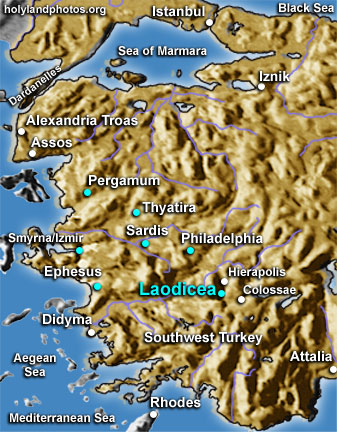
|
 |
|

14. Laodiceans—The city was in the southwest of Phrygia, on the river
Lycus, not far from Colosse, and lying between it and Philadelphia. It was destroyed by an earthquake, A.D. 62, and rebuilt by its wealthy citizens without the help of the state [Tacitus,
Annals, 14.27]. This wealth (arising from the excellence of its wools) led to a self-satisfied, lukewarm
state in spiritual things, as Re 3:17 describes. See on Col 4:16, on the Epistle which is thought to have been written to the Laodicean Church by Paul. The Church in latter times
was apparently flourishing; for one of the councils at which the canon of Scripture was determined was held
in Laodicea in A.D. 361. Hardly a Christian is now to be found on or near its site.
15. neither
cold—The antithesis to "hot," literally, "boiling" ("fervent," Ac 18:25; Ro 12:11; compare So 8:6; Lu 24:32), requires that "cold" should here mean more than negatively cold; it is rather, positively icy cold:
having never yet been warmed. The Laodiceans were in spiritual things cold comparatively, but not
cold as the world outside, and as those who had never belonged to the Church. The lukewarm state,
if it be the transitional stage to a warmer, is a desirable state (for a little religion, if real, is better than
none); but most fatal when, as here, an abiding condition, for it is mistaken for a safe state (Re 3:17). This accounts for Christ's desiring that they were cold rather than lukewarm. For then
there would not be the same "danger of mixed motive and disregarded principle" [Alford].
Also, there is more hope of the "cold," that is, those who are of the world, and not yet warmed by the
Gospel call; for, when called, they may become hot and fervent Christians: such did the once-cold
publicans, Zaccheus and Matthew, become. But the lukewarm has been brought within reach of the
holy fire, without being heated by it into fervor: having religion enough to lull the conscience in false
security, but not religion enough to save the soul: as Demas, 2Ti 4:10. Such were the halters between two opinions in Israel (1Ki 18:21; compare 2Ki 17:41; Mt 6:24). |
 |
|

18.
Gentle and loving irony. Take My advice, thou who fanciest thyself in need of nothing. Not
only art thou not in need of nothing, but art in need of the commonest necessaries of existence. He graciously
stoops to their modes of thought and speech: Thou art a people ready to listen to any counsel as
to how to buy to advantage; then, listen to My counsel (for I am "Counsellor,"
Isa 9:6), buy of Me" (in whom, according to Paul's Epistle written to the neighboring
Colosse and intended for the Laodicean Church also, Col 2:1, 3; 4:16, are hidden all the treasures of wisdom and knowledge). "Buy" does not imply that we can,
by any work or merit of ours, purchase God's free gift; nay the very purchase money consists in
the renunciation of all self-righteousness, such as Laodicea had (Re 3:17). "Buy" at the cost of thine own self-sufficiency (so Paul, Php 3:7, 8); and the giving up of all things, however dear to us, that would prevent our receiving Christ's
salvation as a free gift, for example, self and worldly desires. Compare Isa 55:1, "Buy … without money and price." of me—the source of "unsearchable riches" (Eph 3:8). Laodicea was a city of extensive money transactions [Cicero].
gold tried in, &c.—literally,
"fired (and fresh) from the fire," that is, just fresh from the furnace
which has proved its purity, and retaining its bright gloss. Sterling spiritual wealth, as contrasted with its
counterfeit, in which Laodicea boasted itself. Having bought this gold she will be no longer poor
(Re 3:17). mayest be rich—Greek,
"mayest be enriched." white raiment—"garments." Laodicea's wools were famous. Christ offers infinitely
whiter raiment. As "gold tried in the fire" expresses faith tested by fiery trials: so
"white raiment," Christ's righteousness imputed to the believer in justification and imparted
in sanctification. appear—Greek,
"be manifested," namely, at the last day, when everyone without the wedding garment shall be discovered.
To strip one, is in the East the image of putting to open shame. So also to clothe one with fine apparel is the image
of doing him honor. Man can discover his shame, God alone can cover it, so that his nakedness shall not
be manifested at last (Col 3:10-14). Blessed is he whose sin is so covered. The hypocrite's shame may be manifested now; it must be
so at last. anoint
… with eye-salve—The oldest manuscripts read, "(buy of Me) eye-salve (collyrium,
a roll of ointment), to anoint thine eyes." Christ has for Laodicea an ointment far more precious
than all the costly unguents of the East. The eye is here the conscience or inner light of the
mind. According as it is sound and "single" (Greek, "haplous," "simple"),
or otherwise, the man sees aright spiritually, or does not. The Holy Spirit's unction, like the ancient
eye-salve's, first smarts with conviction of sin, then heals. He opens our eyes first to ourselves in our wretchedness,
then to the Saviour in His preciousness. Trench notices that the most sunken churches
of the seven, namely, Sardis and Laodicea, are the ones in which alone are specified no opponents from without, nor
heresies from within. The Church owes much to God's overruling Providence which has made so often internal
and external foes, in spite of themselves, to promote His cause by calling forth her energies in contending
for the faith once delivered to the saints. Peace is dearly bought at the cost of spiritual stagnation, where there
is not interest enough felt in religion to contend about it at all.
|
 |
|

21. sit with
me in my throne—(Re 2:26, 27; 20:6; Mt 19:28; 20:23; Joh 17:22, 24; 2Ti 2:12). The same whom Christ had just before threatened to spue out of His mouth, is now offered
a seat with Him on His throne! "The highest place is within reach of the lowest; the faintest spark
of grace may be fanned into the mightiest flame of love" [Trench]. even as I also—Two thrones
are here mentioned: (1) His Father's, upon which He now sits, and has sat since His ascension, after His
victory over death, sin, the world; upon this none can sit save God, and the God-man Christ Jesus, for it is the
incommunicable prerogative of God alone; (2) the throne which shall be peculiarly His as the once
humbled and then glorified Son of man, to be set up over the whole earth (heretofore usurped by
Satan) at His coming again; in this the victorious saints shall share (1Co 6:2). The transfigured elect Church shall with Christ judge and reign over the nations in the flesh, and Israel
the foremost of them; ministering blessings to them as angels were the Lord's mediators of blessing and administrators
of His government in setting up His throne in Israel at Sinai. This privilege of our high calling belongs
exclusively to the present time while Satan reigns, when alone there is scope for conflict and for victory
(2Ti 2:11, 12). When Satan shall be bound (Re 20:4), there shall be no longer scope for it, for all on earth shall know the Lord from the least to the greatest.
This, the grandest and crowning promise, is placed at the end of all the seven addresses, to gather all in one. It
also forms the link to the next part of the book, where the Lamb is introduced seated on His Father's
throne (Re 4:2, 3; 5:5, 6). The Eastern throne is broad, admitting others besides him who, as chief, occupies the center. Trench
notices; The order of the promises in the seven epistles corresponds to that of the unfolding of the kingdom
of God its first beginnings on earth to its consummation in heaven. To the faithful at Ephesus: (1) The tree
of life in the Paradise of God is promised (Re 2:7), answering to Ge 2:9. (2) Sin entered the world and death by sin; but to the faithful at Smyrna it is promised, they shall not be
hurt by the second death (Re 2:11). (3) The promise of the hidden manna (Re 2:17) to Pergamos brings us to the Mosaic period, the Church in the wilderness. (4) That to Thyatira, namely,
triumph over the nations (Re 2:26, 27), forms the consummation of the kingdom in prophetic type, the period of David and Solomon characterized
by this power of the nations. Here there is a division, the seven falling into two groups, four
and three, as often, for example, the Lord's Prayer, three and four. The scenery of the last three passes
from earth to heaven, the Church contemplated as triumphant, with its steps from glory to glory. (5) Christ promises
to the believer of Sardis not to blot his name out of the book of life but to confess him before His Father
and the angels at the judgment-day, and clothe him with a glorified body of dazzling whiteness (Re 3:4, 5). (6) To the faithful at Philadelphia Christ promises they shall be citizens of the new Jerusalem, fixed
as immovable pillars there, where city and temple are one (Re 3:12); here not only individual salvation is promised to the believer, as in the case of Sardis, but also privileges
in the blessed communion of the Church triumphant. (7) Lastly, to the faithful of Laodicea is given the
crowning promise, not only the two former blessings, but a seat with Christ on His throne, even as He has sat with
His Father on His Father's throne (Re 3:21).
| Baptizm in the Jordan River, Israel |
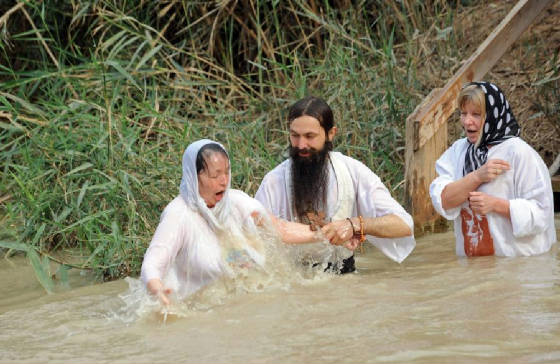
|
| Baptizm- Symbolic entry into Christianity for those who have embraced the Lord Jesus Christ by faith |
|
|

